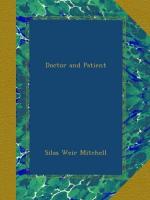In each case there are years of troublesome treatment, all sorts of unpleasant limitations, pain it may be, and certainly, at the best, a variety of discomforts. The joy and little pleasures of youth are gone. It makes one sorrowful to think of such cases, even when all that competent means can do to help them is at their disposal, and still more to reflect on those who have to battle for health with no more resource than is left to the needy. What shall we not do for them! The woman’s whole tendency is to give them all of herself and all else that she can control. Indulgence becomes inevitable, or seems to become so, and the mother is rare who does not insist that they shall have what they desire, and that her other children shall yield to them in all things. Her answer to herself and others is, “They have so little; let them at least have what they can.” As rare as the reasonable mother is the sick child who can stand this treatment and survive with those traits of character which it above all others requires to make its crippled life happy, not to say useful. The child thus unrestrained and foolishly indulged must needs become ill-tempered. It loses self-control, and yet no one will need it more. It learns to expect no disappointments, and life is to hold for it less than for others. Disease has crippled its body and the mother has crippled its character.
I have no belief that long illness is good for the mass of people, but the character of the adult sufferer is in his or her own hands to make, mar, or mend. In childhood the mother is in large measure responsible for the ductile being in her care. If she believes that unrestraint is her duty, she is laying up for the invalid a retribution which soon or late will bitterly visit on the child the sin or, if you like, the mistakes of the parent. It is her business and duty, no matter how hard may be to her the trial, to see that this child, above all others, shall be taught patience, gentleness, good temper, and self-control in all its varieties, nor should she fail to point out, as health returns and years go by, that it is not all of life to be straight and uncrippled. I need not dwell on this. Every wise woman will understand me, and be able to put in practice better than I can here state what I might more fully say.
I do not wish, however, to be understood as urging that all children long ill or crippled grow to be unamiable and spoiled. I do not quite know why it is, but, after all, children are less apt to suffer morally from long illness than adults, and very often, despite careless or thoughtless usage, these young sufferers come out as wholesome in mind and heart as if they had known no trial, or, perhaps, because of it. It is in a measure a matter of original temperament. In other words, what the sick child was as to character modified results, and this is especially true as concerns the peculiarities which attract unpleasant notice. One person who has twitching of the muscles of the face is made miserable by the attention it invites; another is indifferent.




